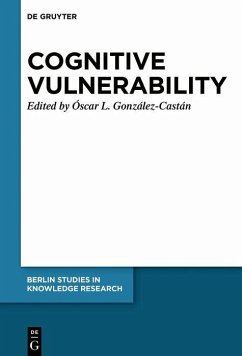However, no attempt has yet been made to fully apply the notion of vulnerability to the domains of epistemology and the philosophy of science, to relate it to our general human vulnerability, and to explore the wide range of consequences that derive from it. The contributors of this book fill this gap; they present new approaches to classical problems. They highlight different aspects of our cognitive vulnerability, from issues related to the realism/antirealism debate to reflections on epistemic success and trust.
Óscar L. González-Castán, Complutense University of Madrid, Madrid, Spain.
Dieser Download kann aus rechtlichen Gründen nur mit Rechnungsadresse in A, B, BG, CY, CZ, D, DK, EW, E, FIN, F, GR, HR, H, IRL, I, LT, L, LR, M, NL, PL, P, R, S, SLO, SK ausgeliefert werden.









